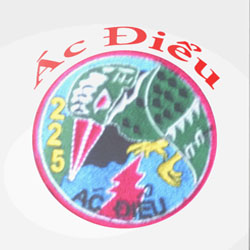
T-R-A T-Ấ-N
Người lính Mỹ trong bộ áo tù tươm tất từ bên trong nhè nhẹ bước ra. Tóc tai gọn ghẽ, trông không có vẻ đói ăn hốc hác như tù cải tạo trong Nam sau 1975. Ông nghiêng mình chào và khoan thai ngồi xuống ghế. Rất trầm tĩnh. Trên ngực áo thấy có bảng tên, trên ống quần ngang đùi là số quân. Ông ngồi nghiêm túc thẳng thắn, hai tay nắm chặt để trên đùi sẵn sàng trả lời câu hỏi như từng sẵn sàng trong các cuộc hỏi cung trước đó. Thế rồi bỗng dưng mắt ông cảm thấy bị chói lòa dưới ánh sáng của những ngọn đèn video. Mắt ông nhức nhối và ông chớp liên tục hy vọng nước mắt sẽ làm dịu êm. Ai xem đoạn video này cũng nghĩ thế, kể cả các quản giáo nhà lao. Ông là người duy nhất được trại giam chọn để trả lời phỏng vấn của nhóm phóng viên truyền hình Nhật Bản trong kịch bản được Hà Nội dàn dựng.
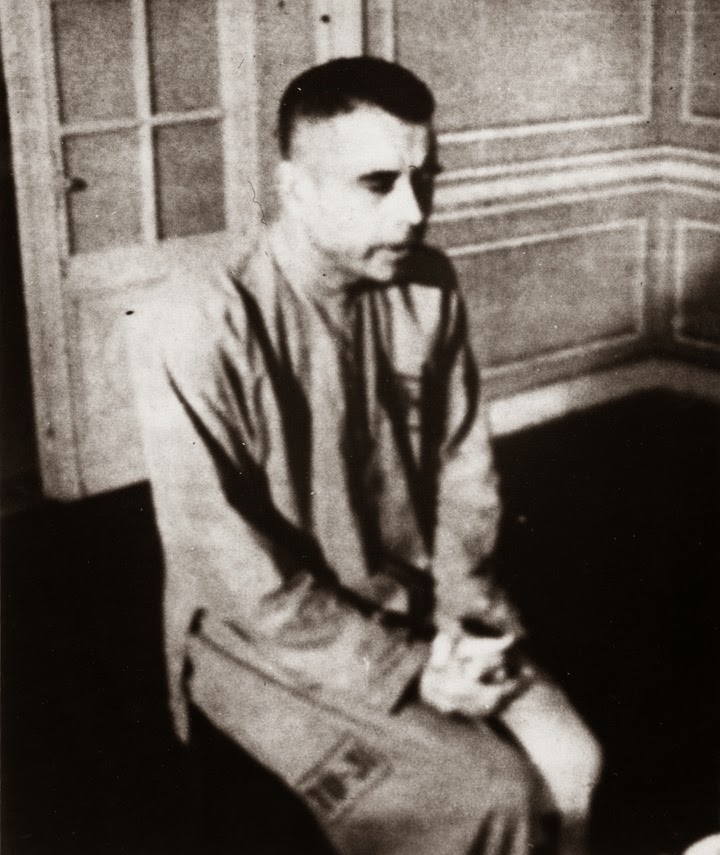
Tù Binh Jeremiah Denton - 1966
Đó là một phần của đoạn video trình chiếu trên tivi Mỹ ngày 17 tháng Năm 1966 - cách nay hơn 48 năm. Phi công đó tên Jeremiah A. Denton của Hải Quân Mỹ, năm đó ông 41 tuổi mang cấp bậc Commander - tương đương Trung Tá. Theo báo chí Hà Nội, ông là một giặc lái đế quốc Mỹ bị lực lượng phòng không Quân Đội Nhân Dân anh hùng bắn hạ và bắt sống khi tham gia phi vụ hành quân thứ 12 tại miền Bắc Việt Nam.
Việc ông trả lời với lời lẽ cương quyết và gan lì không làm cho những người giam giữ ông căm giận - bởi vì chính họ nếu có bị bắt cầm tù ở trong Nam thì cũng phải phát biểu như vậy thôi nhưng việc chớp mắt liên tục khi trả lời phỏng vấn đã khiến ông bị cai tù đánh đập tra tấn tơi tả suốt.
Sự Thực
Phóng viên Nhật hỏi: "Ông được đối xử ra sao?"
Ông trả lời: "Tôi được nuôi ăn đầy đủ kể cả cung cấp quần áo và luôn cả chăm sóc y tế khi tôi cần."
Lúc này camera lấy cận ảnh sát mặt phi công Denton, và người ta nhìn thấy rất rõ ông vừa nói vừa chớp mắt. Ông không bị lóa cũng như không bị chói, thực ra ông đã dùng mắt để đánh tín hiệu Morse cho toàn thế giới biết. Cơ quan tình báo Mỹ đã phát hiện ra điều đó. Dịch tín hiệu Morse ra sẽ đọc được bảy chữ "T-O-R-T-U-R-E tức T-R-A T-Ấ-N."
Đây là lần đầu tiên thế giới được biết tình trạng khốn khổ của tù binh Mỹ qua một chứng nhân đang bị Hà Nội cầm giữ. Họ bị đánh đập và tra tấn. Phi công tù binh John McCain cũng xác nhận điều đó trong tự truyện "How The POW's Fought Back." Hiện ông McCain là Thượng Nghị Sĩ đại diện cho Arizona.
Phóng viên hỏi tiếp: "Ông nghĩ thế nào về điều được gọi là chiến tranh Việt Nam?"
Ông trả lời: "Tôi không biết về điều gì đang xảy ra nhưng cho dù quan điểm của chính phủ tôi như thế nào đi nữa thì tôi cũng ủng hộ - ủng hộ hoàn toàn."
Ông nói tiếp: "Thưa đúng vậy cho dù quan điểm của chính phủ tôi như thế nào đi chăng nữa tôi cũng tin tưởng vào đó. Tôi là một thành phần của chính quyền đó và trách nhiệm của tôi là phải hậu thuẫn cho chính sách đó và tôi sẽ làm điều đó ngày nào tôi vẫn còn sống."
Kế hoạch dùng truyền hình Nhật phỏng vấn tù binh Mỹ nhằm tố cáo chính sách gây hấn của sen đầm Mỹ và tuyên truyền cho một chế độ có chính sách nuôi giữ tù binh nhân đạo và tử tế bỗng chốc biến thành phản tuyên truyền, hiệu ứng ngược. Mãi cho đến khi Trung Tá Jeremiah A. Denton được trả tự do năm 1973 trong đợt phóng thích đầu tiên sau khi ký kết Hiệp Định Paris và viết tập hồi ký "When Hell Was in Session," người ta mới biết thêm nhiều chi tiết kinh hoàng về nhà tù Cộng Sản.
Phi Vụ Nghiệt Ngã
Ngày 18 tháng Bảy, 1965 phi tuần trưởng Trung Tá Hải Quân Denton dắt 28 chiếc phản lực cơ A-6 cất cánh từ hàng không mẫu hạm Independance - từ ngoài khơi biển Nam Hải, trực chỉ Thanh Hóa. Mục tiêu ngày hôm đó: đánh bom và phá hủy một số nhà kho quân sự phía nam Hà Nội.
Đó là phi vụ thứ 12 của ông trên vùng trời Bắc Việt kể từ khi ông tham chiến năm 1964 và không may cho ông cùng bạn đồng hành trên chiếc A-6 Intruder hôm đó là khi đến tọa độ đánh bom đã bị hỏa lực phòng không bảo vệ cầu Thanh Hóa trên sông Mã bắn lên như mưa bão. Phi cơ bị trúng đạn, hệ thống điều khiển tê liệt. Máy bay xoáy như chôn ốc, lao xuống mặt đất. Hai phi công bung dù thoát hiểm và bị bắt ngay sau đó.
"Choáng váng và đau buốt do viên đạn bắn xuyên bắp vế trái, cảm giác đầu tiên của tôi là giận dữ. Giận dữ như điên khùng vì bị bắn rơi, và lại càng giận hơn nữa khi bị bắt giữ," ông kể lại với báo The New York Times năm 1973 - ngay sau khi từ Hà Nội về đến Hoa Kỳ.
Kể từ ngày nghiệt ngã đó và kéo dài trong bảy năm, bảy tháng ông bị chuyển trại nhiều lần kể cả nhà tù Hỏa Lò - được tù binh Mỹ đặt tên Hanoi Hilton và trải qua đủ món ăn chơi từ đánh đòn, bỏ đói, tra khảo trong đó có hơn bốn năm nhốt xà-lim kín và nhiều thời gian giam trong thùng như quan tài. Ông cho biết họ đấm đá, dùng dây curoa quạt điện quất tù binh, hăm dọa tử hình, dùng dây cột bắp thịt để máu không lưu thông khiến toàn thân tê buốt. Tuy nhiên ông, các bạn tù cũng như ông McCain, tất cả đều duy trì hệ thống chỉ huy cùng quân phong quân kỷ nghiêm ngặt. Nhóm tù binh bị cấm liên hệ, trò chuyện thì họ tìm cách liên lạc với nhau bằng cách gõ vào tường đá bằng tín hiệu Morse hay ho hắng; họ quyết tâm không chùn bước trước mọi đe dọa, dụ dỗ, cảm hóa.
"Cách cư xử của chúng tôi, rõ ràng đã làm bọn cai tù nổi điên và buộc họ phải trở nên hung dữ tàn bạo," ông nói.
Khoảng muời tháng sau khi bị bắt, Trung Tá Denton được chọn để làm công cụ tuyên truyền cho chế độ Hà Nội qua trung gian nhóm phóng viên Nhật. Và họ đã thất bại hoàn toàn khi ông Denton bình tĩnh dùng mắt để thông tin cho mọi người biết rằng ông cùng các phi công tù bình đang bị tra tấn.
Từ đó trở đi không phi công tù binh nào được báo nước ngoài phỏng vấn cho đến khi diễn viên Jane Fonda vào thăm Hà Nội năm 1972 và phát biểu một loạt những bừa bãi rác rưởi chống chiến tranh gây tức giận trong cả nước.
Một bài viết có tựa đề "Lại kể chuyện giặc lái B-52" chạy trên trang web báo điện tử Quân Đội Nhân Dân có đoạn như sau:
"... Ri-sớt Giôn-xơn (Richard Johnson) là một viên sĩ quan Mỹ cao gần 2m, mặt to, tai dài, mắt sắc, tóc thưa màu nâu đen điểm những sợi bạc, khoảng chừng 40 tuổi là thiếu tá thuộc Bộ chỉ huy không quân chiến lược Mỹ, số lính 561-54-4696. Hắn giữ chức vụ hoa tiêu ra-đa trên chiếc máy bay ném bom B-52 thuộc đơn vị ném bom số 72, liên đội máy bay ném bom chiến lược số 6 đóng tại căn cứ không quân chiến lược Andersen trên đảo Gu-am. Sau cái đêm 18-12-1972 bị bắt ở Vĩnh Phú cho đến ngày gặp nhà báo Lê Kim, Ri-sớt đã ngồi gần 1 tháng trong trại giam Hỏa Lò. Thời gian không dài nhưng đủ để Ri-sớt thấy được thái độ đối xử độ lượng của các đồng chí trong trại và từ đó bước đầu hiểu chính sách khoan hồng nhân đạo của Chính phủ ta. Có lẽ cũng vì vậy, sau vài phút đầu còn thiếu tự nhiên, dần dà hắn đã cởi mở, không e dè mà kể về những bước thăng trầm trong chuyến bay định mệnh đêm 17-12-1972 của hắn..."
Vậy chính sách khoan hồng nhân đạo của Đảng và Nhà Nước rộng lượng đến mức nào thì theo lời kể của người từng đứng đầu nhà tù Hỏa Lò phải nói là vô biên. Trích bài viết trên NgườiĐưaTin.vn
"... Cựu trại trưởng tù binh Hỏa Lò Trần Trọng Duyệt đã khẳng định: Có lẽ trên thế giới này không có nước nào đối xử với tù binh Mỹ tốt như ở Việt Nam. Đó là nhờ truyền thống khoan hồng và nhân đạo đã có hàng nghìn năm của dân tộc ta. Các tù binh chẳng những được ăn tốt, mà còn được chăm sóc sức khỏe (cả vật chất và tinh thần) rất chu đáo trong điều kiện thời chiến cho phép. Ngoài việc được tận tình cứu chữa vết thương do nhảy dù sau khi máy bay bốc cháy, các tù binh đã được những bác sĩ giỏi nhất ở các bệnh viện 108, 103, 354 của quân đội đến khám và chữa bệnh theo định kỳ. Cho nên, sau cú sốc thần kinh ban đầu lúc họ bị bắt, khi đã vào trại Hỏa Lò hầu hết các tù binh Mỹ đều ổn định tinh thần và sức khỏe rất nhanh. Nhiều người đã có ý thức tập luyện để thích nghi với điều kiện sinh hoạt mới, giữ gìn sức khỏe để đợi ngày được trao trả về nước. Ông Duyệt cho biết: Ở Hỏa Lò hồi đó các tù binh Mỹ thường xuyên được tổ chức vui chơi giải trí. Hằng ngày, họ được ra sân phơi nắng, chơi bóng chuyền, bóng rổ, chọc bi-a, đọc sách báo, nghe tin tức kể cả tin tức của Mỹ và phương Tây qua đài phát thanh mà trại tiếp âm, hoặc chọn những tù binh có giọng đọc tốt để đọc cho tất cả cùng nghe.
Để các tù binh có phương tiện chơi thể thao thường xuyên, trại phải nhờ đến sự giúp đỡ của ông Tạ Đình Đề, người phụ trách xưởng sản xuất dụng cụ của Tổng cục Thể dục thể thao. Thậm chí để giúp một số tù binh có bệnh về mắt có thể đọc được sách báo, Ban chỉ huy trại đã phải thửa khá nhiều cặp kính thuốc của bà Thúy Hà ở cửa hàng số 48 Hàng Bài. Đặc biệt, trong các ngày lễ, ngày Tết của Mỹ như ngày Độc Lập, ngày Lễ Tạ Ơn, Noel, Tết Dương lịch ... tôn trọng tín ngưỡng của tù binh, trại còn cho mời cả mục sư Bùi Hoàng Thử đến làm lễ theo nghi thức tôn giáo cho số người theo đạo. Thỉnh thoảng, trại cho mời các nghệ sĩ của đoàn văn công Tổng Cục Chính trị đến biểu diễn cho bộ đội và cho cả tù binh Mỹ cùng thưởng thức. Ông Duyệt còn nhớ một lần nghệ sĩ Tường Vi đến hát bài “Cô gái vót chông” và “Tiếng đàn ta lư”. Tới đoạn lên cao như tiếng chim hót “Pơ rô tốc... Pơ rô tốc...” Mặc dù không hiểu nghĩa cả bài hát, nhưng tù binh Mỹ khoái quá, vỗ tay rào rào, yêu cầu hát đi hát lại. Đêm ấy, khi buổi văn nghệ đã tan từ lâu, nhưng ở nhiều phòng giam, tù binh không chịu ngủ. Họ bàn tán đủ thứ chuyện về các ca sĩ Việt Nam, rồi còn bắt chước giọng Tường Vi hát “Pơ rô tốc... pơ rô tốc...” suốt đêm.
Để thay đổi không khí cho các tù binh đã phải ở trong trại lâu ngày, được sự phối hợp giúp đỡ của Công an Hà Nội và An ninh Quân đội, Ban chỉ huy trại còn nhiều lần tổ chức cho các tù binh đi tham quan một số di tích lịch sử, văn hóa và danh thắng của Thủ đô Hà Nội như: Hồ Hoàn Kiếm, Công viên Lê Nin, Quốc tử giám, chùa Trấn Quốc, chùa Một Cột, Viện Bảo tàng Quân đội (nay là Bảo tàng Lịch sử Quân sự Việt Nam), bệnh viện Bạch Mai... Để bảo đảm an toàn cho những “vị khách đặc biệt” này, ta đã cho phép các tù binh ăn mặc như khách du lịch: Cũng comlê, cavát, giày đen v.v... và đi theo hướng dẫn viên. Tuy nhiên, cũng có lần nhân dân đã phát hiện ra tù binh Mỹ. Mọi người xì xào: Chuyên gia, khách nước ngoài gì mà mắt cứ nhìn lơ láo, thiếu tự nhiên, đúng là “giặc lái Mỹ” rồi! Vậy là tất cả cùng kéo lại chỉ chỏ, bàn tán, buộc Ban tổ chức phải đưa tất cả lên xe, huỷ bỏ chuyến tham quan dã ngoại theo dự kiến..."
Cũng cần nói thêm là vì chính sách tinh vi này quá khoan hồng và độ lượng nên tháng Tư 1975, chính sách này lại được Hà Nội tái bản và áp dụng cho hàng ngàn quân cán chính miền Nam trong các trại cải tạo.
Đoàn Tụ
Về Mỹ sau thời gian bảy năm "học tập tốt để trở thành công dân tốt," ông trở lại quân đội thăng cấp lên đến thiếu tướng Hải Quân, được bổ nhiệm chức Chỉ Huy Trưởng Trường Tham Mưu Liên Quân đến khi hưu trí năm 1977. Ông đắc cử vào Thượng Viện Hoa Kỳ đại diện cho Alabama năm 1980 đến 1987.
Ông qua đời thứ Sáu vừa qua tại Virginia Beach, thọ 89 tuổi.
Xem phỏng vấn Ông Denton của Truyền Hình Nhật trên YouTube:
https://www.youtube.com/watch?v=BgelmcOdS38
Jeremiah A. Denton Jr., 89, Dies; With Blinks, Vietnam P.O.W. Told of Torture
By ROBERT D. McFADDENMARCH 28, 2014
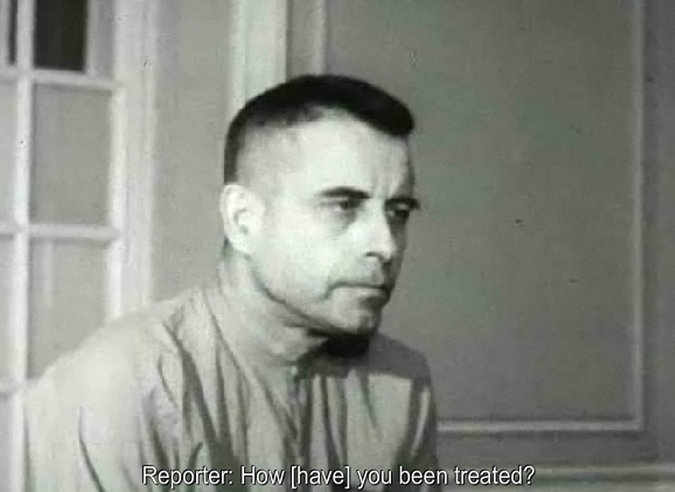
![]()
Cmdr. Jeremiah Denton Jr. blinked the word T-O-R-T-U-R-E in Morse code during an interview while he was a prisoner of war in North Vietnam. CreditNational Archives, via Associated Press
The prisoner of war had been tortured for 10 months and beaten repeatedly by his North Vietnamese captors in recent days, and there were threats of more if he did not respond properly when the propaganda broadcast began. Haggard but gritty, Cmdr. Jeremiah A. Denton Jr. slumped in a chair before the television cameras.
Pretending to be blinded by the spotlights, he began blinking — seemingly random spasms and tics. He answered interrogators’ questions with a trace of defiance, knowing he would be beaten again and again, but hoping that America would detect his secret message in Morse code.
To a question about American “war atrocities,” the captured pilot said: “I don’t know what is happening in Vietnam because the only news sources I have are North Vietnamese. But whatever the position of my government is, I believe in it, I support it, and I will support it as long as I live.”
The North Vietnamese, who lost face, were even more outraged when they learned that Commander Denton, in the Japanese-taped interview broadcast on American television on May 17, 1966, had blinked out “T-O-R-T-U-R-E.” It was the first confirmation that American prisoners of war were being subjected to atrocities during the Vietnam War.
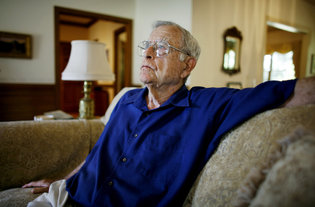
![]()
Jeremiah A. Denton Jr. at his home in Williamsburg, Va., in 2008.
CreditStephen M. Katz/The Virginian-Pilot, via Associated Press
The commander was beaten all night.
Mr. Denton, who returned home after seven years as a prisoner and became a rear admiral and a United States senator from Alabama, died on Friday at Sentara Hospice House in Virginia Beach, his son, Jeremiah A. Denton 3rd, said. He was 89.
Mr. Denton called himself “an average product of Middle America,” but his story was anything but ordinary — a war hero appalled by what he called America’s moral degeneracy, a crusading spokesman for right-wing Christian groups, a one-term Republican senator in the patriotic matrix of President Ronald Reagan. It was a political life shaped by indelible experiences in Vietnam.
On July 18, 1965, Commander Denton, leading a squadron of 28 A-6 Intruder attack jets and flying his 12th mission over North Vietnam, took off from the aircraft carrier Independence in the South China Sea. His bombardier-navigator was Lt. Bill Tschudy, and the target was a complex of military warehouses at Thanh Hoa, 75 miles south of Hanoi.
As he came in over the heavily defended Thanh Hoa Bridge on the Ma River, antiaircraft batteries opened up. Shells riddled the Intruder, knocking out its sophisticated guidance system. The aircraft went into a tailspin, and pain shot through the commander’s left thigh; a tendon had ruptured as he desperately tried to regain control, but it was hopeless. The fliers bailed out and were captured.
“Dazed and bleeding as I was, my principal emotion was fury,” Mr. Denton recalled. “I was mad as hell at being shot down, and even angrier at being captured.”
Over the next seven years and seven months, Commander Denton was held in various prison camps, including the notorious “Hanoi Hilton,” and endured beatings, starvation, torture and more than four years of solitary confinement, including periodic detentions in coffinlike boxes. He and other officers nevertheless maintained a chain of command and a measure of discipline among the prisoners.
“I put out the policy that they were not to succumb to threats, but must stand up and say no,” he told The New York Times in 1973. “Figuratively speaking, we now began to lie on the railroad tracks hoping that the sheer bulk of our bodies would slow down the train. We forced them to be brutal to us.”
The commander was often punished for urging others to resist. He also devised ways for prisoners to communicate by signs or numbers, tapping on a wall or coughing signals in a sequence. Ten months after his capture, he was selected for a propaganda interview to be broadcast on Japanese television.
It became famous after it was discovered that he had tricked his captors and blinked out the Morse code message that exposed North Vietnam’s brutal treatment of prisoners of war.
During his captivity, Commander Denton was awarded the Navy Cross and promoted to captain. In 1973, after President Richard M. Nixon announced a Vietnam peace agreement, Captain Denton was in the first group of prisoners released. “We are honored to have had the opportunity to serve our country under difficult circumstances,” he said at Clark Air Base in the Philippines.
His ordeal in Vietnam was graphically chronicled in a 1976 memoir written with Ed Brandt, “When Hell Was in Session,” and made into a 1979 NBC television movie starring Hal Holbrook and Eva Marie Saint.
In the book, he described an ordeal under torture. “A special rig was devised for me in my cell,” he recalled. “I was placed in a sitting position on a pallet, with my hands tightly cuffed behind my back and my feet flat against the wall. Shackles were put on my ankles, with open ends down, and an iron bar was pushed through the eyelets of the shackles.
“The iron bar was tied to the pallet and the shackles in such a way that when the rope was drawn over a pulley arrangement, the bar would cut into the backs of my legs, gradually turning them into a swollen, bloody mess. The pulley was used daily to increase the pressure, and the iron bar began to eat through the Achilles tendons on the backs of my ankles. For five more days and nights I remained in the rig.”
Promoted to rear admiral, he was named commandant of the Armed Forces Staff College in Norfolk, Va., a post he held until his retirement in 1977. Dismayed by what he regarded as a widespread failure of morality in America — from adolescent promiscuity to political disunity and disrespect for authority — Mr. Denton, in 1977, established the Coalition for Decency, dedicated to family values and good citizenship.
A Roman Catholic, he also became a consultant to the Christian Broadcasting Network and to his friend Pat Robertson, founder of the Christian Coalition, and began lecturing on domestic and foreign affairs, voicing support for the military services and for the contra rebels in Nicaragua.
In 1980, capitalizing on his war-hero image and running on a platform of strong national defense, he was elected to the Senate, defeating the Democrat, James E. Folsom Jr. He was Alabama’s first Senate Republican since Reconstruction and the first former admiral elected to the Senate. He served from 1981 to 1987, compiling a solid conservative voting record. He lost his bid for re-election in 1986 to Richard C. Shelby, a Democratic congressman who later became a Republican and who continues to hold the Senate seat.
Jeremiah Andrew Denton Jr. was born in Mobile, Ala., on July 15, 1924, one of three sons of Jeremiah and Irene Steele Denton. His father, a hotel clerk, moved the family often and the boy attended 13 elementary schools. In 1936, his father left the family, which returned to Mobile, and the parents were divorced in 1938. Jeremiah Jr. attended a parochial high school, McGill Institute, excelling in athletics and graduating in 1942. He studied at Spring Hill College in Mobile, but in 1943 entered the United States Naval Academy at Annapolis, Md., and graduated with honors in engineering in 1946.
In 1946, he married the former Kathryn Jane Maury. The couple had seven children. Mrs. Denton died in 2007.
Besides his son Jeremiah, Mr. Denton is survived by his second wife, Mary Belle Bordone; four sons, William, Donald, James and Michael; two daughters, Madeleine Doak and Mary Beth Hutton; a brother, Leo; 14 grandchildren and six great-grandchildren.
He served aboard the aircraft carrier Valley Forge in 1946 and 1947, testing and flying blimps. He also took flight training and became a pilot in the late 1940s, and over the next decade served as a flight instructor, test pilot and squadron leader. He studied at the Armed Forces Staff College and the Naval War College, becoming an expert on airborne electronics and antisubmarine warfare, and in 1964 earned a master’s degree in international affairs from George Washington University.
A year later, Commander Denton began flying missions over Vietnam.
Correction: March 28, 2014
An earlier version of this obituary misspelled the surname of one of Mr. Denton’s daughters. She is Madeleine Doak, not Doat. It also misidentified the Latin American country in which the Contra rebels operated. It was Nicaragua, not El Salvador.
A version of this article appears in print on March 29, 2014, on page D8 of the New York edition with the headline: Jeremiah A. Denton Jr., 89, Dies; With Blinks, Vietnam P.O.W. Told of Torture.
Ex-senator and Vietnam POW who blinked "torture" in Morse code dies
- Prisoner of war Jeremiah Denton declared his loyalty to the U.S. government during a 1966 interview for what was supposed to be a propaganda film. But his enraged captors missed his more covert message: "T-O-R-T-U-R-E," blinked into the camera in Morse code, a dispatch that would alert the U.S. military to the conditions he endured.
Denton, who would survive 7 1/2 years confined in a tiny, stinking, windowless cell at the infamous "Hanoi Hilton" and other camps before his release in 1973, died of heart problems Friday in Virginia Beach, Va., at age 89, his grandson Edward Denton said.
The elder Denton later became the first Republican from Alabama elected to the U.S. Senate since Reconstruction, though the iron will that allowed him to persevere in captivity gave rise to criticism he was too rigid a politician.
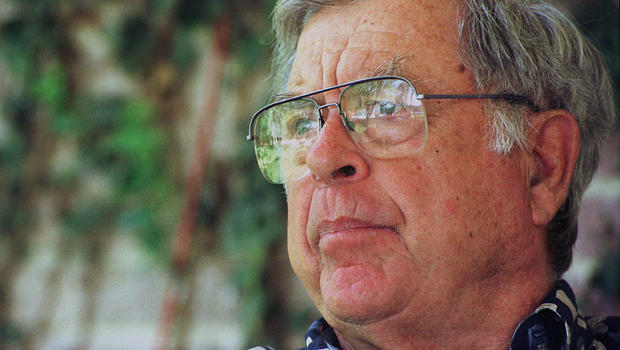
In this May 19, 1999 file photo, Retired Admiral Jeremiah Denton is interviewed at his home on Fowl River, Ala.
AP PHOTO/MOBILE REGISTER, BILL STARLING, FILE
In July 1965, a month after he began flying combat missions for the U.S. Navy in Vietnam, the Mobile native was shot down near Thanh Hoa. He was captured and recalled his captivity in a book titled "When Hell Was in Session.""They beat you with fists and fan belts," he told the Los Angeles Times in 1979. "They warmed you up and threatened you with death. Then they really got serious and gave you something called the rope trick." The use of ropes - to cut off circulation in his limbs - left him with no feeling in his fingertips and intense muscle spasms, he said.
Some of the most severe torture came after the 1966 interview, in which he confounded his captors by saying that he continued to fully support the U.S. government, "and I will support it as long as I live."
"In the early morning hours, I prayed that I could keep my sanity until they released me. I couldn't even give in to their demands, because there were none. It was pure revenge," Denton wrote.
The tape was widely seen, and U.S. intelligence experts had picked up the Morse Code message. But Denton theorized later that his captors likely figured it out only after he was awarded the Navy Cross - the second-highest decoration for valor - for the blinks in 1974.
He said his captors never brought him out for another interview. But with the war's end drawing closer, he was released in February 1973.
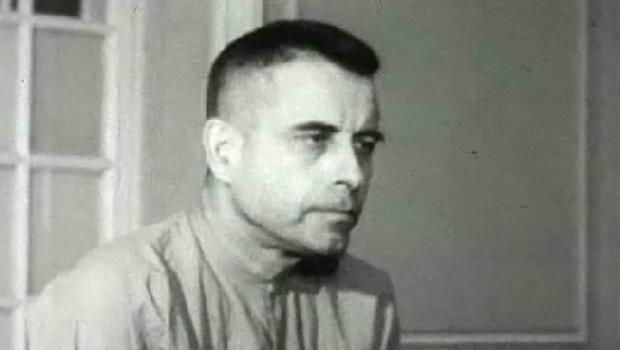
Navy Cmdr. Jeremiah Denton Jr had been a prisoner of war in North Vietnam for nearly 10 months when he was interviewed by a Japanese television reporter on May 2, 1966, as part of a propaganda campaign. During the interview, Denton blinked the word ?T-O-R-T-U-R-E? in Morse code, giving the first clear confirmation that American POWs were being tortured.(National Archives, records of the CIA)
Denton was the senior officer among former POWs who stepped off a plane into freedom at Clark Air Base in the Philippines. Denton epitomized the military spirit as he spoke for the returning soldiers: "We are honored to have had the opportunity to serve our country under difficult circumstances. We are profoundly grateful to our commander-in-chief and to our nation for this day. God bless America."
His words and bearing, beamed back to his country by television, gave heart to the military at a time of increasing uncertainty and bitter division over the course of the war.
He was promoted to rear admiral and retired from the Navy in November 1977. Denton then turned to politics, despite having no experience running for a statewide political office. With Ronald Reagan atop the GOP ticket, Denton became the first Republican elected to the Senate from Alabama since the Reconstruction era following the Civil War.
In Washington, he was a Reagan loyalist, a defender of military might and an advocate for a return to traditional family values and conservative stands on moral issues. But critics said his rigid stands left him no room for political compromise and lessened his influence, limiting his ability to help Alabama.
Denton lost his re-election bid in 1986 by only a fraction of a percentage point.
After his defeat, Denton founded the Coalition for Decency and lectured about family causes. Denton also launched a humanitarian outreach to needy countries through his National Forum Foundation, which arranged shipments of donated goods.
"He was a war hero, an honorable senator, and a family man who cared deeply about his country," said a statement from U.S. Sen. Richard Shelby, who as a Democrat defeated Denton in 1986. Shelby switched to the GOP in 1994 and was elected to a fifth term in 2010.
Arizona Sen. John McCain, who also was held captive as a POW in Vietnam, described Denton as his mentor.
"As a senior ranking officer in prison, Admiral Denton's leadership inspired us to persevere, and to resist our captors, in ways we never would have on our own," McCain said.
Alabama Sen. Jeff Sessions called Denton a "friend, warrior, leader, and hero."
"He was a man of grit and character that can't be manufactured," Sessions said in a statement. "His word was his bond and his loyalty was unshakable."
In later years, Denton lived in Williamsburg, Va., but he still appeared at patriotic gatherings. In November 2008, an emotional Denton watched at Battleship Memorial Park in Mobile, Ala., as a newly restored A-6 Intruder fighter/bomber - like the one he flew over North Vietnam - was rolled out in his honor.
Denton's grandson, Edward, said that on one hand, Denton was a normal grandfather who enjoyed taking his grandchildren fishing aboard his boat in Mobile. "On the other hand," he said, "he was a war hero and someone who set an example for being what being a good, patriotic American is all about."
CBS affiliate WKRG reports that Denton, a native of Mobile, attended McGill Institute and Spring Hill College before graduating from the Naval Academy.
© 2014 CBS Interactive Inc. All Rights Reserved. This material may not be published, broadcast, rewritten, or redistributed. The Associated Press contributed to this report.
Remembering Vietnam War Hero and US Sen. Jeremiah Denton
http://abcnews.go.com/WNT/video/remembering-vietnam-war-hero-us-sen-jeremiah-denton-23108151
https://www.youtube.com/watch?v=BgelmcOdS38
.jpg)


